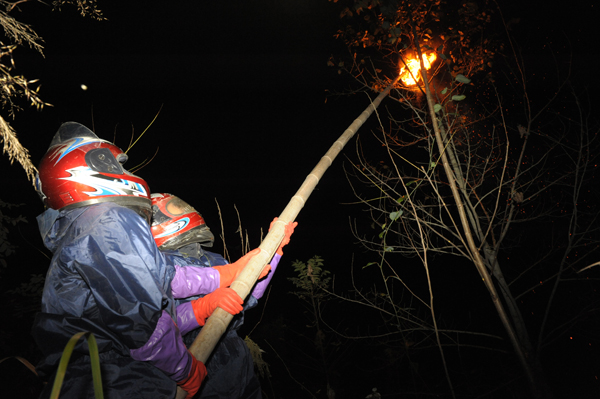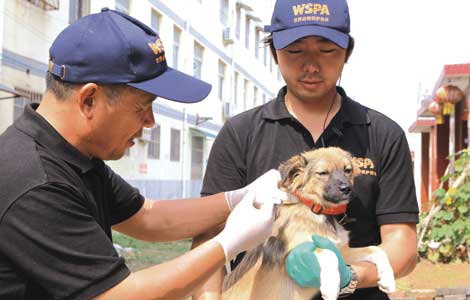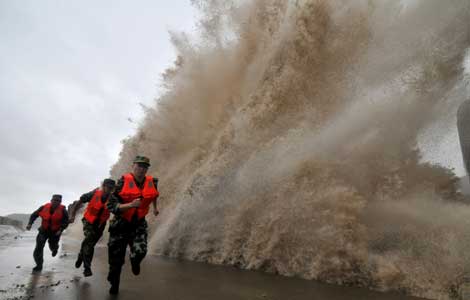Wasp stings in sharp decline
Updated: 2013-10-07 23:56
By Ma Lie in Xi'an (China Daily)
|
||||||||
|
 |
|
Workers set fire to a wasp nest in Ankang, Shaanxi province, where severe wasp stings have claimed 42 lives since July. Provided to China Daily |
Efforts to remove deadly wasps that have killed 42 people in Ankang, Shaanxi province, since July have begun to pay off, as the number of cases of severe wasp stings dropped significantly in the past week, health authorities said.
The city's health authority said the number of cases plummeted from about 40 per day in early September to less than 10 per day on Oct 5, and there had been no reports of stings over the past two days.
Meanwhile, there were no deaths reported for five days from Oct 2, the city's health bureau said on Monday.
Since July, 1,640 people injured by wasps in this northwestern city have been hospitalized, and 42 of them have died.
Wasps are active from May to October. Huang Rongyao, director of the Ankang management and quarantine station for forest pests, said the unusual transition from humid and rainy weather to dry and hot conditions in Ankang this summer was the cause of the problem in the city's forested mountainous areas.
Severe wasp stings can damage people's circulatory, nervous and urinary systems, with serious cases resulting in death, medical experts say.
Miao Wenqi, chief officer of the Ankang city firefighter brigade, said that more than 7,200 nests were removed after nearly 4,000 people joined the fight against wasps.
The reduced death toll was also attributed to local government's efforts in providing emergency treatment.
After the fatal cases were reported, the Shaanxi provincial government earmarked 2 million yuan ($327,000) to get equipment for emergency medical treatment.
Meanwhile, the Ankang city government organized 1,230 doctors and nurses and trained 503 grassroots medical staff to treat patients in a timely manner.
Thirteen hospitals in the city were designated to receive patients, and financial support was provided to poor patients, said Zhang Quanming, deputy mayor of the city in charge of health matters.
Wasp prevention work was specially arranged at the city's tourism spots during the National Day holiday from Oct 1 to 7 in order to protect the tourists, Zhang said.
"There was no report that tourists were injured by the insects during the holiday," Zhang said.
The National Health and Family Planning Commission, the State Forestry Administration and Shaanxi provincial government have all sent their working teams to Ankang.
The National Health and Family Planning Commission published the wasp stings treatment guidelines on its website last week to guide the wasp eradication work and patient treatment.
Currently, 206 people injured by wasps are hospitalized, all in stable condition, Zhang said.
The fight against wasps will continue, he added.
Over the past years, severe wasp stings were reported in Shaanxi, Sichuan and Henan provinces, and more than 100 people have died from severe wasp stings.
Experts said there are several reasons that wasps attack local residents, including people unknowingly violating the animals' territory and using cosmetics that attract them.
The higher mortality rate of wasp victims was possibly related to the current widespread use of pesticides, which enhances the toxicity of the stings, experts said.

 Firming friendships
Firming friendships
 A smog-filled Beijing targets polluting cars
A smog-filled Beijing targets polluting cars
 Animal welfare to be added in training
Animal welfare to be added in training Chasing the dragons
Chasing the dragons
 Boehner: US on path to default if Obama won't negotiate
Boehner: US on path to default if Obama won't negotiate
 New couples take wedding photos during holiday
New couples take wedding photos during holiday
 Williams beats Jankovic to win second China Open title
Williams beats Jankovic to win second China Open title
 Red alerts as Fitow closes in
Red alerts as Fitow closes in
Most Viewed
Editor's Picks

|

|

|

|

|

|
Today's Top News
WB cuts growth forecast for China, East Asia
Kerry hails weapons destruction
Robust home sales during holiday
China calls on the United States to stay solvent
Beijing targets polluting cars
APEC 'should take lead' in FTA talks
US, Japan warned over sea issues
Academics evaluate China at conference
US Weekly

|

|






